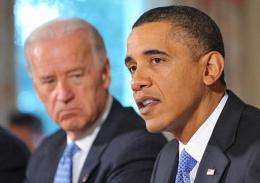Obama unveils new biofuels, carbon capture, initiatives

US President Barack Obama on Wednesday unveiled a new strategy to reinvigorate US production of biofuels, vowing he would not let nations like China race ahead in building new energy economies.
Obama is embracing a host of traditional sources of power, including coal and nuclear and new energy sources, like wind power, as he attempts to improve dim prospects for cap-and-trade climate legislation in Congress.
He said his government's Environmental Protection Agency had mandated the production of 36 billion gallons of biofuel production in the United States by 2022, up from 11.1 billion gallons produced last year.
Obama argued that increasing production of renewable fuels would reduce US dependence on oil by more than 328 million barrels a year and cut greenhouse gas emissions by more than 138 million metric tons a year by 2022.
"The bottom line is this: I am convinced that America can win the race to build a clean energy economy, but we're going to have to overcome the weight of our own politics.
"We have to focus not so much on those narrow areas where we disagree, but on the broad areas where we agree," Obama said in remarks to a bi-partisan group of state governors at the White House.
Biofuels are made from natural resources like plants, vegetable oils or fats, that can be converted to power vehicles for example, and are much more environmentally friendly than traditional fossil fuels.
Obama also announced an interagency task force to study carbon capture techniques to reduce greenhouse emissions from coal fired power stations and to help develop cleaner coal.
"It's been said that the United States is the Saudi Arabia of coal -- and that's because, as I said, it's one of our most abundant energy resources," said Obama.
"If we can develop the technology to capture the carbon pollution released by coal, it can create jobs and provide energy well into the future."
The president said he wanted 10 commercial carbon capture and storage projects up and running by 2016.
A bipartisan effort to pass a cap-and-trade bill in the Senate to tackle global warming appears under threat, as election year politics and delays for other key administration agenda items create a log-jam on Capitol Hill.
(c) 2010 AFP


















